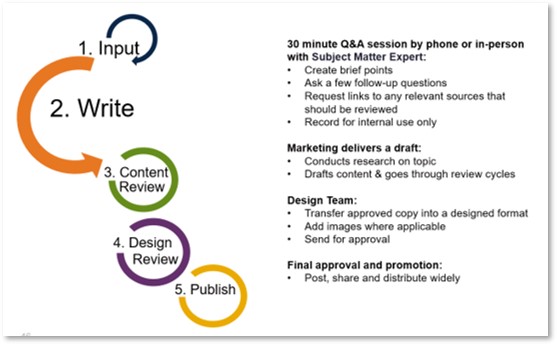How To Be A Great Subject Matter Expert

Have you been identified as a subject matter expert by your company’s marketing team? While there are few engineers, technicians, and other skilled professionals who walk around thinking of themselves as subject matter experts, the fact is that if you know a lot about a niche topic, you’re a subject matter expert. And that means your knowledge is invaluable to your company’s marketing efforts. Marketing for many companies now involves education, which means a variety of content – things like articles, whitepapers, blog posts, videos, webinars and other formats.

If your company’s marketing team has asked you to participate in the development of some content, you’re probably wondering what that means and what exactly you’re supposed to do.
This article will help.
We’ll start with the background on content market and the role of subject matter experts, and then get into the nuts and bolts of what’s involved in being a great subject matter expert.
The Context for Subject Matter Experts
Modern marketing for business-to-business (B2B) companies involves content marketing, which is sometimes also called Thought Leadership marketing. Content marketing involves creating and distributing educational materials like videos, blogs and social media posts. It differs from what people usually think of as marketing because it does not explicitly promote a particular company or product. It is intended to educate and help readers diagnose their situation and identify potential solutions. Content marketing is much less ‘marketing-y’ than what most people think when they hear the word marketing.
One of the most important aspects of content marketing is to simplify complexity, so that people who are not experts on a particular subject can learn about the topic and increase their understanding. Since a lot of B2B companies deal in complex and technical products and solutions, content marketing is one of the best ways they have to raise awareness and educate prospective customers.
The Role Of The Subject Matter Expert
A crucial element of content marketing is, well, the content. That’s where subject matter experts come in. In order for marketers to put together good content for a company, they need to tap into the knowledge of people who work intimately with the subject.
You, as someone who spends most of your day thinking and dealing with the relevant topic, know a lot about it (even if you don’t realize it). Your job in being a subject matter expert is to share some of your knowledge to help other professionals gain insight they need to understand their situation and choose the right solution. Your job is to work with the marketing team to product content that helps your target audience gain that knowledge.
How To Be A Great Subject Matter Expert In 4 Steps
While every company will have its own process for producing content, there are some common phases in the process, and a few steps you can take to be a great subject matter expert.
1. Confirm the Content Development Process
Your marketing team will tell you about the process for creating content. At Mezzanine, the general process is:

For each specific situation, the marketing team will also let you know:
- The objective and focus of the content – who it’s targeting and how it’s going to be used
- If you’ll receive questions in advance to review
- If there is already an outline for the piece
- If you should speak to certain pain points of prospects or customers or more generally
- If you’ll need to provide the direction that you think the content piece should go in
- Who’s involved in the next steps of the process, what the timelines are, and what your next steps are.
Don’t hesitate to ask for clarification. Your questions are always helpful. You might have a sense of whether the content is going to resonate with customers in particular industries or segments. If you aren’t sure which industry the article is going to target, ask. If you don’t know whether you should mention certain products or services, ask. Your marketing team should be able to address your questions and provide clarification – and it’s possible that you are asking questions that haven’t been tackled yet, but need to be.
2. Prepare for the Conversation
To prepare for the conversation, take a few moments to think about what you want to cover. Many subject matters experts like to sketch out an outline of the topics and subtopics with bullet points before they do the interview, so that they’re not flustered while talking. The outline should identify the major points to be included in the content – it could also be responses to the questions you’ve been sent.
3. During the Conversation
The day has arrived, it’s time for your conversation. There are two ways that you can help the marketing team make the most of their time with you:
a. Stay on Topic
One of the challenges of B2B marketing is that the products and solutions are complex. But the job of content marketing is to simplify complexity, so that people who are not experts can learn about the topic and increase their understanding. Your readers are coming from a place of limited knowledge, so the content has to take them from their current level of understanding to a higher level.

That means it’s important to stick to one topic and not go down intellectual rabbit holes. You, as the subject matter expert, should focus on the most important elements and avoid getting side tracked on elements that might seem interesting, but ultimately will be a distraction for learners.
If you find you’re thinking about a lot of ancillary issues while discussing a particular topic, put them in a ‘parking lot’ and share them with the marketing team. They might be great future topics to explore.
b. Think About the Target Reader
Every piece of content is created with a specific kind of reader in mind. It isn’t always just your ideal prospect. Because there are various decision makers when it comes to B2B products and services, marketing needs to create content to attract and engage all the different stakeholders. Some content will be for end users, C-level executives, purchasing specialists, consultants, and others. If you aren’t sure about the target audience, ask. Good content is always built with a specific kind of reader in mind.
4. Reviewing First Draft
After you’ve provided your insights, the marketing team will create the content piece and share it with you for your feedback.
This is a critical step.
At this stage, it’s vital to provide all your feedback, as there are only 2 (yes, TWO) edit cycles – first draft and final. Don’t make the mistake of doing a quick pass on the first draft because you think you’ll have lots of future opportunity for changes. You won’t.
Take the time now to review the piece for accuracy. Keep in mind that there are a lot of subjective aspects to writing and the copywriter may be following an existing style or tone set out by your marketing team. If this is the first time you’re working with a particular writer, you may need to provide more guidance on the style and tone than you will in future, once the writer learns your style.
Save yourself time and heart ache by focusing primarily on the accuracy of the content. Make sure that the terminology is correct, used appropriately, and conveys what you think matters. If, when reviewing the content, you want to add in something that you forgot to mention earlier or didn’t think of at first – add it in now if it will make the piece more comprehensive and valuable.
That’s it! Your job is done.
What Happens Next in Content Marketing
After the content piece is created, the marketing team will take care of distributing it far and wide. It will likely go on your company’s website, be shared on LinkedIn, go out through email marketing, and the company’s social media channels.
You can also do your part to bolster your own reputation (without bragging) by sharing the piece to your network through personal emails and post it on your personal LinkedIn. It’s a great way to let your professional and personal family network know what you are doing and to share key insights with potential clients or partners.
As a subject matter expert, you have a wealth of valuable information. You may think it’s dull or not particularly special, but to someone who it trying to learn about your industry and profession, it’s valuable and fascinating.
Follow these tips the next time you are tapped to share your insights and you’ll see how smooth and easy the process is to create great B2B marketing content.
Additional Resources
- 15 Tips To Get Your Content Noticed
- What Is Content Marketing And How Does It Grow B2B Companies
- The Importance Of Content Marketing For Manufacturers
Find us on social:
.png?width=2361&height=488&name=Mezzanine%20Logo_Horiz_RGB_on%20blue%20(1).png)






